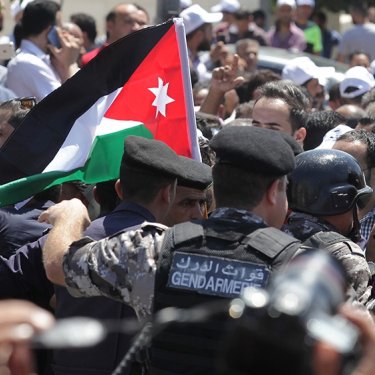Jordan bans coverage of teachers’ protests

Reporters Without Borders (RSF) condemns Jordan’s gag order on all media coverage of protests by the country’s teachers and the ensuing arrests of several journalists. These measures obstruct the right to news and information and are unacceptable, RSF says.
Amman Magistrates Court issued the gag order on 9 August amid continuing protests by teachers, whose union was closed by the authorities on 25 July. Teachers have been protesting for weeks, above all about the government’s decision to freeze a planned pay rise because of the Covid-19 crisis.
The court’s ban came a week after the attorney general issued his own ban on coverage of the teachers’ protests. Article 255 of Jordan’s criminal code and article 39 of its press and publications law allow judges to ban “any publication related to a case or a crime under investigation.” However, the ban on coverage of the teachers’ protests does not directly involve such a case.
Journalists who were outside the headquarters of the teachers’ union on the day it was closed accused the police of sealing off the street, which prevented them from filming. One of these reporters, Omar Akour, was clubbed over the head and his equipment was damaged although he had identified himself as a journalist.
“This publication ban is an unacceptable violation of the right to inform and is evidence of a sharp decline in the climate for Jordanian journalists,” said Sabrina Bennoui, the head of RSF’s Middle East desk.
“This measure is all the more unacceptable for being taken with the sole aim of restricting coverage of a news story. Preventing coverage of subject in which the public has an interest does not make it go away. On the contrary, gagging the media and flouting the right to inform cast a lasting blemish on a country’s image.”
Several journalists who have tried to cover the protests or comment on the subject in defiance of the news blackout have been arrested. They include Bassel Al-Okour of the Jo24 news website, Khalil Qandil of the Albosala site, and Laith Al-Juneidi, a correspondent for the Turkish news agency Anadolu, who were arrested for violating the ban on 28 July, 3 August and 9 August respectively.
The Internet has meanwhile been subjected to drastic speed reductions in recent days while Facebook live-streaming has been restricted when protests are taking place, according to NetBlocks, an NGO that monitors the Internet.
Jordan is ranked 128th out of 180 countries in RSF's 2020 World Press Freedom Index.



